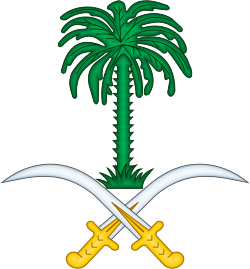Prostitution in Saudi Arabia
Prostitution in Saudi Arabia is illegal.[1] Prostitution is punishable by prison and flogging.[2] In April 2020, the flogging punishment was abolished by the order of the Saudi Supreme Court General Commission, and is now limited to jail time or fines. [3][4]Foreign nationals are also deported after punishment.[5] If the parties are also charged with adultery, fornication and sodomy, which can apply to both the prostitute and the client since all sexual activity outside a lawful marriage is illegal, the punishment can be death.[6]
Prostitutes tend to be mostly from Nigeria, Ethiopia,[7] Yemen, Morocco, Pakistan, Nigeria, Ethiopia, and Tajikistan.[8]
The Religious Police are responsible for carrying out floggings. Prostitutes may be whipped in public. Some of these have been carried out excessively and deaths have resulted.[5] However, the punishment of flogging was abolished in April 2020, and replaced by fines or jail time.[9] Foreign prostitutes who are arrested by the Saudi vice police face deportation.[7]
In June 2007, 80 women were sent to trial for prostitution and 20 men for trafficking or pimping.[5]
Misyar
Misyar marriage is often used as a legal relationship for sexual pleasure under Salafi law that is used to prevent prostitution. The relationship is like a normal marriage except that the husband is not required to obtain a house for the wife, and in some cases he is not responsible to pay the monthly expenses to the wife. All other Islamic requirements should be obtained. The Grand Mufti of Saudi Arabia, Shaikh Abdulaziz al-Shaikh, and 60 other scholar have endorsed Misyar in their fatwas.[10]
Misyar varies from Nikah mut'ah (Shia Islam) in that the length of the relationship is not defined and it shall have two witnesses on the marriage agreement.[10]
Sex Trafficking
Saudi Arabia is a destination country for women subjected to forced prostitution.[11]
Saudi Arabia is one of the largest consumers of domestic workers. Around 30% of Saudi's population of 27.3 million are immigrants from other countries. The Law requires that all of the expatriates in Saudi Arabia should have an employment contract while they are in the country.[12] But with some unfair work practices such as sexual harassment, extreme working conditions, and other human rights violations, many try to escape their employers. Runaways are often kidnapped and forced into prostitution.[13]
In 2013, the government did not report any prosecutions or convictions of alleged human traffickers.[13] In 2017, although there were 177 trafficking cases prosecuted, none were for sex trafficking.[11]
The United States Department of State Office to Monitor and Combat Trafficking in Persons ranks Saudi Arabia as a 'Tier 2 Watch List' country.[11]
See also
Notes
- "Asia Times - Asia's most trusted news source for the Middle East". Retrieved 21 April 2016.
- "Saudi Police Seize 80 For Prostitution, Pimping," Middle East Times, June 22, 2007
- "Saudi Arabia to eliminate flogging punishment". Saudigazette. 2020-04-24. Retrieved 2020-04-24.
- "Saudi Arabia to abolish flogging - supreme court". BBC News. 2020-04-24. Retrieved 2020-04-24.
- ZAHARIE, Cristian Giuseppe. "THE LEGAL REGIME OF PROSTITUTION ON THE MUSLIM COUNTRIES" (PDF). REPEC. Retrieved 25 October 2017.
- Federal Research Division (2004). Saudi Arabia A Country Study. p. 304. ISBN 978-1-4191-4621-3.
- "BBC News - FROM OUR OWN CORRESPONDENT - Saudi's sleazy underworld". 2001-11-20. Retrieved 21 April 2016.
- "Country Narratives -- Countries Q through Z". U.S. Department of State. 2007-06-12. Retrieved 21 April 2016.
- "Saudi Arabia to abolish flogging - supreme court". BBC News. 2020-04-24. Retrieved 2020-04-24.
- "LEGALIZED PROSTITUTION IN SAUDI ARABIA". CIF INTERNATIONAL ASSOCIATION. Retrieved 25 October 2017.
- "Saudi Arabia 2018 Trafficking in Persons Report". U.S. Department of State. Archived from the original on 30 July 2018. Retrieved 30 July 2018.
- Hammad S., Alhamad. "The Labor Market in Saudi Arabia: Foreign Workers, Unemployment, and Minimum Wage". inquiries journal. inquiries journal. Retrieved 30 November 2016.
- "Saudi Arabia". U.S. Department of State. Retrieved 21 April 2016.
